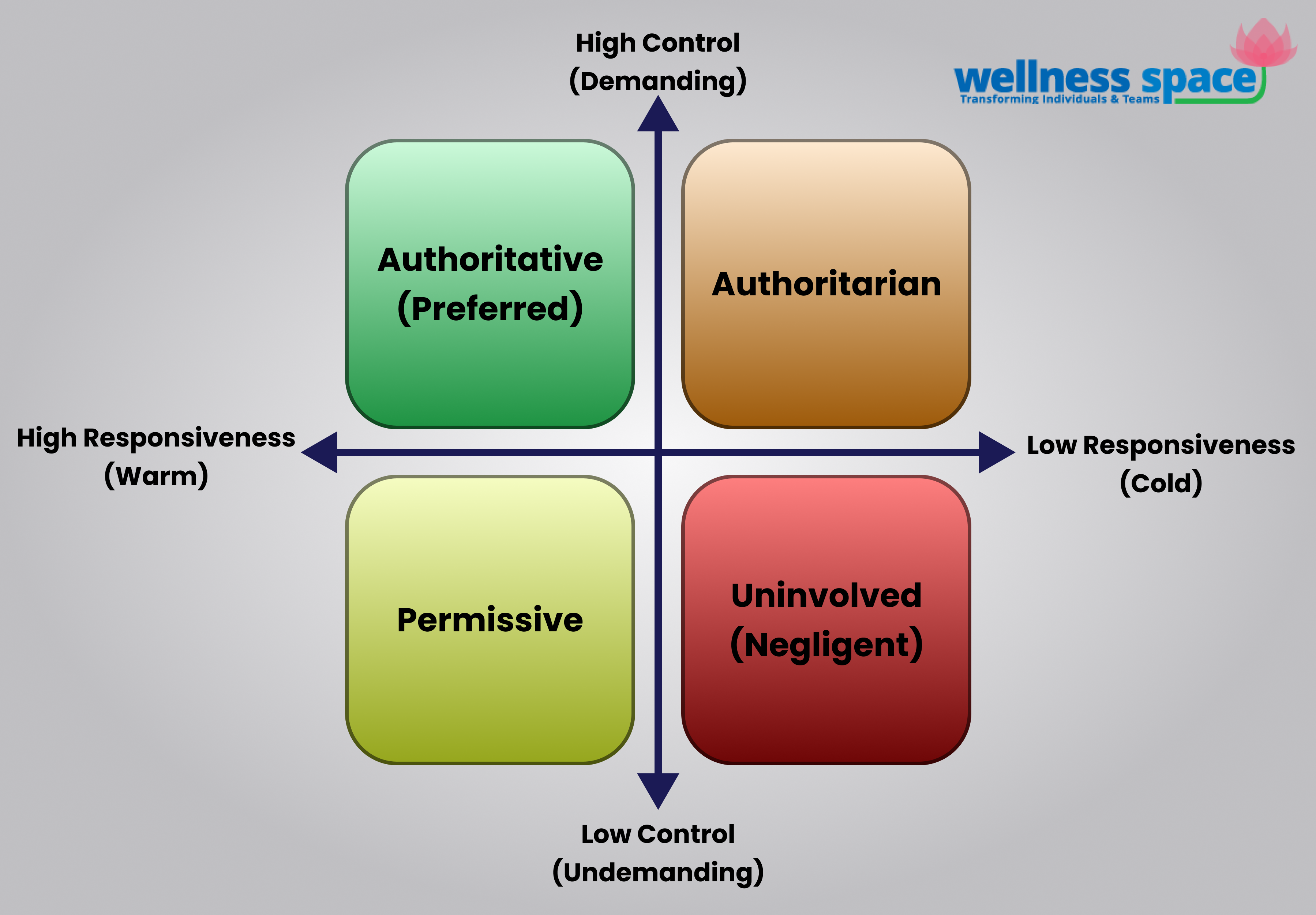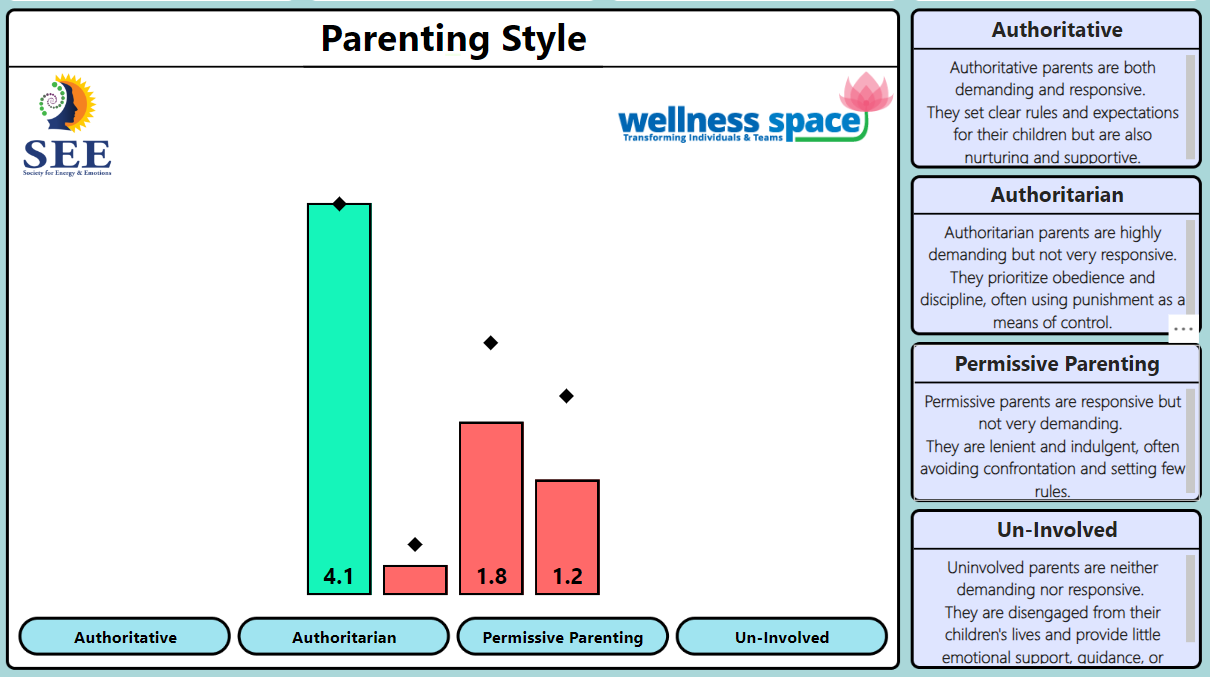Diana Baumrind, a clinical and developmental psychologist, coined the following parenting styles: authoritative, authoritarian, and permissive/indulgent. We have done extensive work on assessing these styles and explore what influences the styles, and how parents can recognize the impact of their parenting style on child’s growth and development.
In our workshop on “Pathways to Positive Parenting“, we encourage the parents to understand their parenting style and, based on that, facilitate better interactions with the children. Four parenting styles are highlighted below for reference.
Riri and Anagha’s book on parenting also covers the types of parenting styles and how to pursue a balanced parenting style for the long-term health and well-being of your children. You can purchase the parenting book, here This Book Won’t Teach You Parenting
We also offer a self-assessment of your parenting style here.
Parenting Style
Defining authoritative, authoritarian, permissive, and uninvolved parenting typologies can be achieved by examining differing levels of acceptance and rejection, behavioral control, and psychological control unique to each style.
In addition, parenting types can be distinguished by identifying other parenting characteristics that have been empirically linked to each style[1].
Psychologist Diana Baumrind proposed a widely recognized framework for categorizing parenting styles based on her research in the 1960s and 1970s. These four parenting styles are characterized by demandingness (control) and responsiveness (warmth). Remember that these styles are idealized categories, and real-life parenting often involves a mix of these elements. The styles have been studied in several countries, including India. The four parenting styles are:
Authoritative parenting style:
Demandingness: High
Responsiveness: High (warm and responsive)
Authoritative parents set clear rules and expectations but provide warmth, support, and open communication. This parenting style encourages a two-way dialogue, allowing children to express their opinions and thoughts. While authoritative parents have high expectations, they are also responsive to their children’s needs and concerns. This balance fosters a positive parent-child relationship. Some experts claim that the Authoritative parenting style is the optimal parenting style and has been related to positive child outcomes such as self-reliance, social responsibility (Baumrind, 1971), and adjustment.
Authoritarian parenting style:
Demandingness: High
Responsiveness: Low
In an authoritarian parenting style, parents set strict rules and high expectations for their children. They value obedience and discipline, often using a “because I said so” approach. Communication tends to be one-way, with little room for negotiation or explanation. The focus is on control, and warmth and support may be lacking.
Authoritarian parents are highly demanding and are often punitive and forceful in adhering to an absolute standard for behavior. This parenting type has been related to less optimal child outcomes, including lower self-efficacy, more externalizing problems, and rebellion[2].
Permissive Parenting:
Demandingness: Low
Responsiveness: High
Permissive parents are lenient and indulgent, placing few demands on their children. They are nurturing and responsive, often avoiding the use of strict rules. While this parenting style can create a supportive and warm environment, it may lack the structure and boundaries necessary for healthy child development. Permissive parents might be more like friends than authority figures.
Permissive parents avoid coercive or confrontational practices as much as possible. Additionally, permissive parents have been conceptualized as indulgent and allowing children to make their own rules and decisions. This parenting type has been related to child outcomes such as lower achievement, lack of impulse control), and lower autonomy.
Uninvolved (Neglectful) Parenting:
Demandingness: Low
Responsiveness: Low
Uninvolved parents are characterized by a lack of emotional involvement and responsiveness to their children’s needs. They may be neglectful or emotionally distant, providing minimal guidance and support. This parenting style can negatively affect a child’s well-being and development, as it lacks structure and emotional nurturing.
Parents of this type behave in any way necessary to minimize
parenting effort and time. Thus, uninvolved parents may
respond to a child with hostility or not respond, neglecting the child’s needs. The uninvolved parenting style is also linked to the use of coercive practices and a lack of monitoring.
Caution on interpretation:
It’s important to note that these styles are not rigid categories, and parents may exhibit different styles in various situations. Additionally, cultural factors, individual personalities, and the child’s temperament can influence parenting styles. The most effective parenting style tends to be authoritative, balancing high expectations with warmth and responsiveness, promoting a healthy and supportive environment for a child’s growth.
Understanding parenting style:
We have developed a dashboard that guides the parents about their style. Based on existing evidence, the parent is able to understand the areas of strength and opportunity.
Do you wish to understand how parents’ childhood trauma affects their parenting style? You can go through the video
References:
[1] Kimble, A. B. (2014). The parenting styles and dimensions questionnaire: a reconceptualization and validation. Oklahoma State University.









Leave A Comment